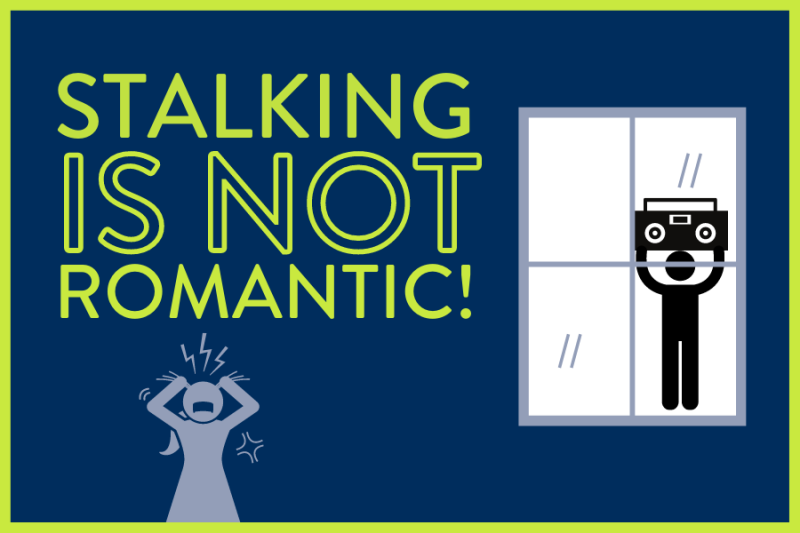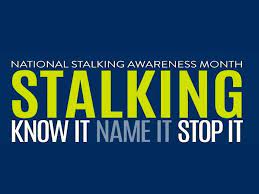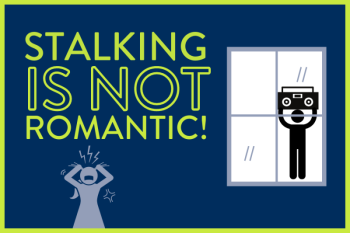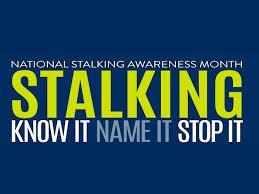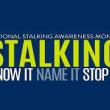Stalking: It’s not about love, it’s a crime
You look out your kitchen window ... and he’s standing outside right next to your car.
At the grocery store, as you walk from your car toward the store, the hair on the back of your neck raises up; you turn and look behind you and there he is, sitting in his car staring at you.
You broke up two months ago, but his consistent presence out there has unnerved you. The other day, you found the courage to tell a friend about your ex’s behavior. She suggested he just sat in your driveway – again – because he wants to talk, but keeps changing his mind. And, your friend says, it was probably nothing more than coincidence that he was at the store when you were ... But, you know better.
What the friend doesn’t know is the first time your ex showed up in your driveway, he forced his way into the house and beat you up because you were wearing makeup. And when you were together, he timed you whenever you went out – to the store, laundromat – wherever.
According to Stalking Prevention Awareness & Resource Center (STALK), “Stalking behaviors often have specific meanings known only to the offender and the victim. Studies have shown that victim fear is an excellent predictor of victim danger.”
In the scenarios above, the friend didn’t know those details. She didn’t know that once an abuser has acted against you, all he has to do is threaten to do it again – knowing you will be terrified of history repeating itself.
SPARK statistic: 72% of victims are threatened with physical violence and 84% of victims are fearful and concerned for their safety.
The tactics in the above example – following you or coming to the house – are among the tactics employed by stalkers, in this case one known to the victim.
Most stalkers use more than one of the following tactics. These are U.S. statistics from stalkingawareness.org: 75%, unwanted phone calls; 57%, show up and/or approach victim; 57%, send texts, email and messages; 52%, follow, watch; 26%, send gifts, cards and/or letters.
Stalking happens every day to more people than you might think. Stalkingawareness.org states one in three women and one in six men will experience stalking in their lifetime. Think about that for a minute. That means you or someone you know is, was, or will be stalked. Currently, 13.5 million people are stalked every year.
New Hope Midcoast (NHM) serves Lincoln, Knox, Sagadahoc and Waldo counties. Executive Director Rebekah Paredes reported, “In terms of statistics, we technically had 140 cases that were documented as stalking in our database during our last fiscal year (October 2021-September 2022). However, we are concerned that this is an under-reported statistic as stalking behaviors are very common in domestic violence cases. Advocates may not have separately identified stalking behaviors as a concern when entering information into our database regarding the client's experience and needs.”
Who are the men and women who stalk? Acquaintances make up 42% of this group; 40% are current or former partners; 19% are strangers; and 8% of stalkers are family members or brief encounters.
Keeping a log of each incident is recommended to help establish a pattern of behavior. Examples of what to include are harassing or repeated phone calls, texts, and messages; following or waiting for you; sending you letters or gifts; tracking you; damaging your property; spreading rumors about you; posting private information or photos of you; impersonating you; hacking into your accounts; threatening you or those close to you; and threats communicated through other people.
NHM Legal Advocacy Director Susanna Norwood, LSW acknowledges stalking can be hard to prove and this leaves victims feeling unsafe everywhere they go.
“One of the ways that advocates at New Hope Midcoast might support a survivor experiencing stalking would be to offer an individualized safety plan to suit their unique situation. This could include support around reporting the incidents to law enforcement, help with filing a protection from abuse order, a stalking log to keep track of contact or unusual activity, technology to increase safety at home or in the community, and a plan for what the survivor and their children can do in an emergency.
“Our advocates are also available 24 hours a day just to talk and process what is happening in the survivor’s life,” continued Norwood. “Stalking often leaves people feeling like no one believes them, or worse they may start to question what is happening and wonder if it is real. NHM advocates understand the complexities of domestic abuse and stalking and can help support survivors as they navigate what can be a challenging path to safety.”
Examples NHM advocates hear from callers include: People stalked by an intimate partner often are stalked for a longer period than those stalked by someone who is not a former or current intimate partner; and intimate partner stalkers are more likely to approach the victim, escalate behavior, use weapons, and to re-offend; the stalker makes repeated unwanted contact, sends unwanted gifts and /or monitors victims using technology.
Stalking, warn NHM advocates, is a sign of increased danger for homicide; some other signs of increased danger are strangulation, serial battery, suicidality of the abuser, and sexual assault. Stalking indicates the risk of intimate partner homicide is three fold higher; this data is specific to male abusers stalking their female partners.
NHM advocates say stalking can happen before, during and after a relationship. And in most cases, the victim knows the perpetrator.
NHM advocates support people experiencing stalking through safety planning and providing legal advocacy (people experiencing stalking can ask for a PFA (protection from abuse order) instead of a PFH (protection from harassment), even if the person stalking them is not an intimate partner. Safety planning around stalking can also include tips for tech safety and privacy, since technology can often be misused to stalk or surveil.
From TechSafety.org: If you think that someone is monitoring your computer, tablet, or mobile device, try using a different device that the person hasn’t had physical or remote access to in the past, and doesn’t have access to now (like a computer at a library or a friend’s phone). Take action and create a tech safety plan. Check out the advice at https://www.techsafety.org/resources-survivors/technology-safety-plan
Previous articles on stalking in Boothbay Register/Wiscasset Newspaper
https://www.boothbayregister.com/article/spyware-peace-mind-or-violation-privacy/45613
https://www.boothbayregister.com/article/spyware-what-you-don-t-know-can-hurt-you/47836

